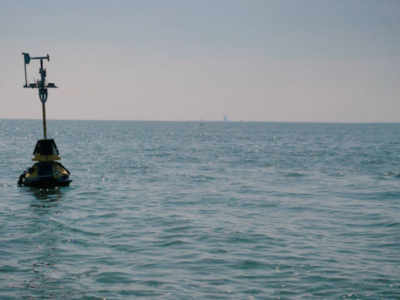
Keep up with energy-related developments in the Great Lakes area with Great Lakes Now’s biweekly headline roundup.
Click on the headline to read the full story:
Illinois
- Pritzker, Lightfoot tout city’s $422 million deal for green energy — Chicago Sun-Times
Chicago has signed a $422.2 million agreement with Constellation New Energy, LLC to provide renewable power to government buildings, street lights and all other city assets — and a carbon-free footprint — by 2025.
- Illinois gearing up for significant investment in EV charging network along highways — Chicago Sun-Times
The federal government will be delivering $5 billion over the next five years across the country — with Illinois receiving over $148 million — so states can build out electric vehicle charging infrastructure to support climate-friendly modes of transportation.
- Department of Energy looks to Illinois to lead on low-income community solar — Energy News Network
Illinois is one of five states where the U.S. Department of Energy is piloting a program to expand community solar for low-income households by leveraging an existing federal low-income heating and cooling assistance program.
Indiana
- Solar energy powers water plant — Inside Indiana Business
Gary, Indiana officials have cut the ribbon on a solar array that will power the city’s water distribution center. The $600,000 solar project will provide enough power to meet the energy needs of the facility. It will produce approximately $1 million in savings over the next 25 years which will benefit customers by helping to keep water rates more affordable.
- Solar developer files appeal of deadline extension denial — The Herald Bulletin
A developer appeals a local board’s denial of a request to extend the construction timeline for an Indiana solar project, claiming opponents’ legal action has prevented the company from seeking financing.
Michigan
Ford and DTE Energy signed an agreement which the companies say is the largest ever renewable energy purchase from a U.S. utility. Ford’s purchase of carbon-free electricity through DTE will avoid as much as 600,000 tons of carbon dioxide emissions. The story was covered by multiple outlets.
The 30- to 40-year federal licenses to operate the dams Consumers Energy owns on the Muskegon, Manistee, Grand, Kalamazoo and Au Sable rivers are set to expire beginning in 2034 and the Michigan utility is seeking public input on future usage.
A new housing development in Ann Arbor hopes to be one of the first net-zero neighborhoods in the country.
- Electric buses a distant goal for northern Michigan schools, despite EPA push — Traverse City Record-Eagle
School districts in rural northern Michigan say they will struggle to transition to electric buses, even with federal funding, because of long routes and cold weather.
The state of Michigan and Consumers Energy enter into a 20-year agreement to power 1,274 state buildings with renewable energy.
- How EV charging efforts could shape the future of Michigan recreation and industry — Michigan Advance
the state plans to expand its network of electric vehicle chargers, including placing charging stations in state and national parks, it also is working to make sure marginalized and underserved residents have a stake in the growing EV economy.
A federal solar energy test center opens in Michigan’s Upper Peninsula to research how effective solar technology can be in severe winter environments.
Minnesota
Northeastern Minnesota tribes are deploying various strategies to adapt to climate change’s effects on their lands and ecosystems.
Minnesota regulators only rejected about 10% of the costs that major gas utilities plan to pass on to customers from a February 2021 storm that lead to a price spike. Customers will have to cover 90% or about $600 million.
Ohio
- Ohio Supreme Court upholds permit for offshore wind farm on Lake Erie — Ohio Capital Journal
The Ohio Supreme Court upheld a decision Wednesday granting a permit for developers to build the nation’s first offshore, freshwater wind farm off the coast of Lake Erie. In a 6-1 ruling, the court rejected arguments from Bratenahl residents who claimed the wind turbines posed a lethal threat to birds and bats.
- After legal win, Lake Erie offshore wind project backers look to reboot progress — Energy News Network
After being stuck in legal limbo for more than two years, backers of the first Great Lakes offshore wind project work to revive their plans following a favorable Ohio Supreme Court ruling.
- Ohio Lt. Gov. Jon Husted pushed to make tainted House Bill 6 nuclear bailout even larger — Cleveland.com
Text messages show that Ohio Lt. Gov. John Husted pushed to make the state’s HB 6 nuclear bailout law even larger. The texts don’t suggest Husted engaged in any illegal activity, but they provide a glimpse into the level of communication FirstEnergy executives had with Husted as HB6 made its way through the legislature.
- Coal plant subsidies from pay-for-play legislation have cost Ohioans $173 million — Ohio Capital Journal
Ohio ratepayers have paid $173 million to cover losses from three utility companies’ investments in two coal plants since 2020 based on provisions in the HB 6.
Ontario
- Nuclear waste site selectors delay announcement until 2024 — Northern Ontario Business
Forty-nine chiefs of the Nishnawbe Aski Nation passed a resolution at their annual conference in Timmins opposing plans to haul and store nuclear waste in the region. Though the potential site of the repository is not in NAN treaty area, leadership hold concerns about the downstream impact of such a facility in the waterways of their traditional territories.
- Wataynikaneyap Power Project reaches a construction milestone — Northern Ontario Business
It’s a milestone moment for Wataynikaneyap Power. The majority Indigenous-owned utility company completed the first phase of a life-changing transmission line project in northwestern Ontario. The aim of the $1.8-billion project is to hook up remote communities to the provincial power grid for the first time and reduce the use of expensive, unreliable and carbon-emitting diesel generators.
Wisconsin
We energies reached an agreement with the city of Pleasant Prairie, Wisconsin to leave water pipelines in place at a recently demolished coal plant along Lake Michigan.
National
Passage of the Inflation Reduction Act is expected to have a major impact on the renewable industry and was covered by multiple outlets.
- U.S. solar faces new barriers after year of ‘crisis’ — E & E News
Leaders of the Nation’s largest solar trade group said the varied policy supports in the Inflation Reduction Act will have a monumental effect on the solar industry including; new or extended tax incentives, project investments and domestic manufacturing.
- Inside Clean Energy: ‘Solar Coaster’ Survivors Rejoice at Senate Bill — Inside Climate News
Solar advocates celebrate the U.S. Senate passage of the Inflation Reduction Act, which includes a 10-year extension of the full investment tax credit that helped the industry take off in recent years.
Each state will ultimately decide how quickly and how much of the Inflation Reduction Act actually ends up reducing emissions. The divide between red and blue states could ultimately warp how the United States’ first real climate law takes shape.
- More Midwest banks see opportunity to finance solar, energy efficiency projects — Energy News Network
A growing number of small and regional Midwest banks are among the latest to start competing with national lenders to finance solar installations. Advocates hope the trend creates more options, trust and comfort for borrowers.
- A hydropower plant could change St. Louis energy. It could also kill a giant river fish. — St. Louis Post-Dispatch
Decades of efforts to restore a lake sturgeon spawning site near St. Louis paid-off this past spring when fish were seen spawning for the second in the past 40 years. But there’s an equally gigantic problem: the sturgeon spawning site which is the only known location in Missouri is in the path of a new hydropower plan. The conflict pits clean energy supporters against wildlife conservationists.
Catch more news at Great Lakes Now:
Energy News Roundup: Green jobs, solar farms and the value of trees




